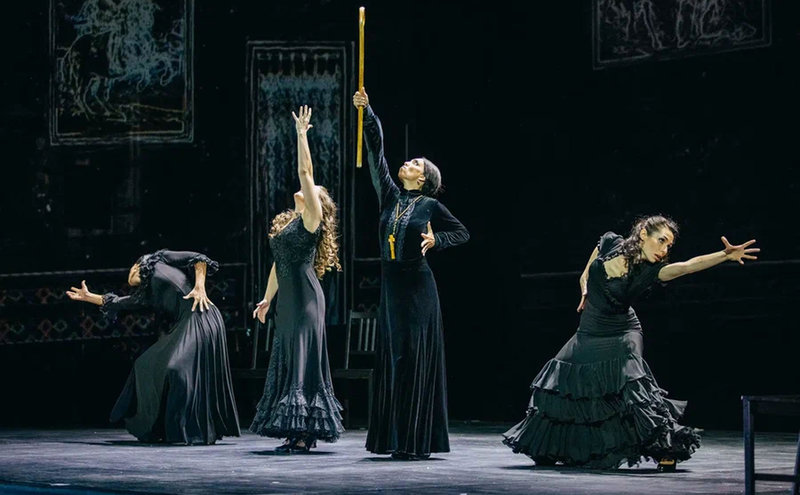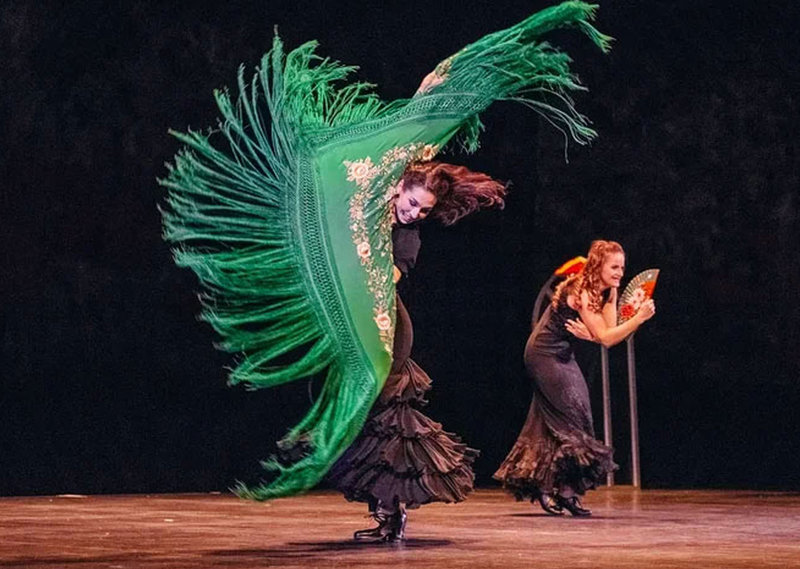The art of combating Russian isolation
A flamenco dance centre in Russia is an example of the importance Russians give to culture, which for many is a way of overcoming conflict and maintaining links with the wider world
The young Russian dancers from one of the main flamenco centres in Moscow were in tears before the rehearsal. The talented Barcelona dancer Susana Larriba, in charge of perfecting the women’s movements, did not know why they were crying and doubted it was because of the emotional intensity of the work they had to perform. In the end, they explained to her that the Russian president, Vladimir Putin, had decreed a partial mobilisation and that meant a large part of the male population could be called up and sent to the battlefront in Ukraine. It was a political decision that created upheaval in many Russian families, anxious about whether a husband, son or friend would be forced to take up arms against their will. Larriba, putting herself in the shoes of the anxious students, saw that flamenco could be a tool to channel their emotions and began to train and mould the young women with all the delicacy of a potter.
“One of the dancers told me that her husband had gone to Israel to avoid taking part in the conflict. I have contacts there and offered to help her. Emotions have been running high,” she laments.
Dance is an artistic discipline that is deeply rooted in Russian society. Many young women attend classes for many years, and not a few go on to forge a solid career in dance with an international profile. The passion for dance is not only reflected in the fact that the main theatres – considered temples of culture in Russia – never fail to schedule performances of the great classics, such as Tchaikovsky’s Swan Lake or The Nutcracker, but also in the interest in Russia to learn rhythms and movements from other parts of the world, such as flamenco.
“The Flamenquería (the name of the centre that promotes the traditional Spanish dance) in Moscow called me because they wanted to put on a performance, and I accepted without hesitation, despite the current situation. Thirteen years ago, when the centre opened, I conducted rehearsals there, and now that they have remembered me, I decided to go back,” explains Larriba, who is from Barcelona and who teaches flamenco. She also directs shows performed in this artistic dance form that UNESCO declared a Masterpiece of the Oral and Intangible Heritage of Humanity in 2010.
The dancer’s work culminated on November 17, when at the Moscow Art Theatre the Flamenquería performed the show, The House of Bernarda Alba, inspired by the work of Spanish dramatist Federico García Lorca and featuring the choreography of the award-winning Javier Latorre.
In The House of Bernarda Alba, Lorca told the tragic story of a family suffocated by the oppression of an extremely traditional society that demands strict mourning after the death of the patriarch. The work embodies values, emotions and situations that, despite the distance in time and place, has links with the reality of today’s Russia. It is a coincidence that Larriba aimed to explore on stage and to invite reflection from the Muscovite audience. On the day of the premiere, a team from a major Russian television network went to the theatre to record parts of the performance and to interview Larriba. “It is a work that is related to the current situation in the country because it talks about family dramas due to the death of the father...”, she pointed out in front of the microphone.
Yet her answer could hurt sensitivities in a country where there is now little room for manoeuvre when the media has become another weapon in the conflict, so the journalist asked her to give a different answer for the report. Larriba, aware she was touching on a taboo subject, made the work of the journalists easier by changing her words to distance the plot from current events. Yet she tried and that has merit in a country where many today prefer to keep their political opinions to themselves and their inner circle.
The flamenco centre organises a festival every year to which Spanish dance stars are invited, but this year the artists were advised to avoid travelling to Russia. “The centre proposals to some important figures, who receive subsidies from the Spanish State, but they could not come, even though the Flamenquería is a private initiative,” explains Larriba. Even the Spanish embassy did not appear on the promotional posters as a sponsor, as it has done in previous years. Yet culture is a door that never shuts completely for those who are determined to pass through.
Interest in and even passion for the cultures of other countries is something that remains undiminished among many Russians, despite sanctions and the disdain that many now perceive directed at them from beyond their borders. While some continue to watch Netflix movies – which requires a VPN internet connection so that viewers can pretend they are in another country since the American platform cancelled its service in Russia – other young people are interested in learning Catalan at Moscow State University. Culture remains a very thin thread but one that is also resistant, uniting people despite the fact that the war in Ukraine has created a new iron curtain that it seems European and Russian leaders are determined to strengthen.
Yet culture is a double-edged sword, and while it can provide a way of avoiding a rift between peoples and countries, there are also large European institutions that have decided to deny Russia’s role in universal culture. The renowned Russian conductor Valery Gergiev is an example of this, after the Munich Philharmonic dismissed him as conductor and major European theatres, such as La Scala in Milan, dispensed with his services. In fact, the legendary theatre in northern Italy will soon start its season with the Russian opera Boris Godunov, with the participation of artists from the country, and its managers have felt the need to publicly justify the decision. Soprano Anna Netrebko and dancers from the Bolshoi Theatre have also had performances cancelled in Europe. They are decisions that the Kremlin argues show how prevalent Russophobia is, and they help fuel the sense of victimhood in the government’s nationalist discourse.
In large bookstores in the Russian capital, such as Xitai-Gorod, Respúblika, Biblio-Globus or Molodaia Gvardiya, there are customers who feel that there are fewer books in English since the interruption of trade relations with Western countries, while others point out that they are seeing more titles with a military theme. Despite the fact that one has to measure one’s words very carefully in today’s Russia, there are still publications that do not follow the government line, such as the digital literary magazine Gorky Media, which has made such recommendations as: “Books to counter propaganda” or “Why Russia is the way it is”. This is far from the norm, however, as can be seen with the recent law passed by the Duma banning “homosexual propaganda” - a pretext to further corner a systematically oppressed group. There are online bookstores, such as Labyrinth, which have announced that they will review the titles they have for sale to comply with the new regulations. These are cultural windows to other worlds and universes that the central power seeks to close.
In an exhibition hall next to the Bauman Garden, very close to the centre of Moscow, an art-loving millionaire originally from Yekaterinburg has brought together some 250 art pieces by Dalí and Picasso. Despite the fact that the media have recently questioned the authenticity of some of the works, the exhibition has been a remarkable success due to the interest that the two painters arouse and because activities have been organised around the exhibition, such as European wine tastings. It is a way to explore Catalan lands through wine tasting and art at a time when, once again, as Winston Churchill stated after the end of the Second World War, “an iron curtain has descended on Europe”.
feature international
feature international




